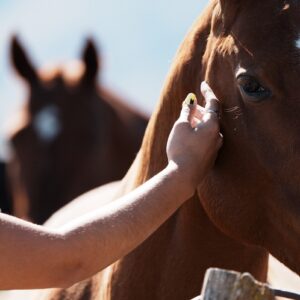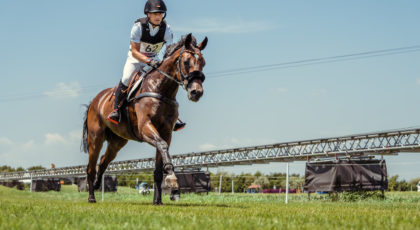In May 2019, an employee of a fuel company arrived at a farm in Carroll County, MD, for a routine visit to fill a fuel tank behind a barn.
In the many times the worker had been on the property previously, the barn door had always been closed. This time, however, the door was open. Finding it unusual, he peeked around the door to find emaciated horses locked in dilapidated stalls and standing in high piles of manure. He knew enough from that initial glance to recognize that the horses were in poor condition, so he called animal control.
In the end, it was determined that seven Arabian and Arabian-cross show horses had been confined to their stalls for at least four years and all of the horses suffered from extreme hoof neglect and lack of proper nutrition, parasite control, veterinary, and dental care. The horses were seized and taken to Days End Farm Horse Rescue, (DEFHR), in Woodbine, MD.
Sadly, two of the horses had to be euthanized within days of arrival due to extreme hoof neglect that resulted in founder and advanced ringbone beyond the point of rehabilitation. Two more were euthanized following rehabilitation due to dangerous behavior and for degenerative suspensory ligament disease, respectively.
Luckily, following rehabilitation, three of the horses found their happily ever after in new forever homes as companions. Two of the three, Elegant Eliza and Iconic Indigo, were adopted together.

Identifying equine neglect and abuse
Despite all of the information available to us in today’s busy world, including access to the internet and social media, the suffering of neglected horses largely comes down to a lack of proper education, according to DeEtte Hillman, Equine Programs Director, DEFHR.
While the situation the fuel company worker discovered was extreme, many horses that end up in a state of neglect are subject to issues that result from a lack of awareness on the owner’s part about appropriate equine care—things like proper dental care needed for a horse to process its food, deworming protocols, and the changing needs of an ageing horse, for example. These are issues that may be less apparent to the common observer, but if they persist, are detrimental to the animal in the end.
“Oftentimes, [neglect and abuse] is a situation that subtly progresses over time,” stated Hillman. “It’s not a dramatic, one-time event that makes it clear to everyone. This makes it easy for issues to develop right under your nose.”
Neglect and abuse can be hard to detect at the onset, making the lines blurry for the average onlooker. So, what are the warning signs of equine neglect and abuse?
Understanding the “minimum standards of care” is a solid starting point to identify a suffering horse. The good news is, these standards are things that the common observer, like the fuel worker, can see and recognize if you know what to look for—this helps make intervention possible.

Minimum standards of care
It’s important to recognize that minimum standards of care are not “the law”—they are horse care guidelines established by experienced horse industry members. While not laws, the standards help educate law enforcement officers, juries, and horse owners—many of whom aren’t necessarily familiar with horse keeping best practices—interpret and/or apply animal cruelty statutes.
Though the standards of care in the United States vary by state and by community, it is typical that they cover or include the following recommendations:
- Nutritious food in sufficient quantity: Horses must have access to forage as well as have nutritious food of sufficient quality—wholesome, palatable, and free from contamination, such as feces, mold, mildew, and insects, etc.
- Proper drink: Horses must have access to potable water.
- Space: A horse’s space must be clean and safe; void of filth that may cause lung, feet and skin issues, as well as void of debris or materials that could be harmful, such as jagged metal. Additionally, horses must have freedom of movement as necessary to reduce stress and maintain good physical condition.
- Shelter: Shelter for horses should have at least a roof and three sides and be kept in good repair and free of standing water, accumulated waste, sharp objects, and debris.
- Air: Enclosed areas should be constructed or modified to allow free flow of air to control temperature and humidity, and to prevent air stagnation.
- Necessary veterinary care: A horse should receive proper veterinary care in the event of suspected injury or illness, as well as for ongoing maintenance such as hoof care, dental care, deworming, vaccinations, and so on. In addition, proof of testing for Equine Infectious Anemia (Coggins test) may be mandated by law for horses crossing state lines, being bought or sold, or attending a show or gathering.
Hillman notes that the above minimum standards are just that—the minimum. Horses will have specific, unique needs, and different climates and seasons will carry varying levels of risk and require horses to be cared for in other ways, such as ensuring water buckets don’t freeze or that horses are blanketed if clipped during a cold winter.
However, if it’s clear that any of the above standards aren’t being met, then it’s quite possible that a horse is suffering, or on a downward trajectory that can lead to severe and life-altering problems.
How to help
If you find yourself suspecting improper care, know that time is of the essence and the sooner intervention can take place, the better chance you’ll have of saving a horse’s life.
Call your local police (the non-emergency line) or animal control—these are the two entities that can step in quickly to evaluate the situation and determine how to proceed with the interest of the animal in mind.
It’s also worth noting that animal control can assist with more than intervention in a neglect or abuse case. If a horse gets loose or becomes trapped in a fence, for example, animal control can help.
The bottom line, according to Hillman, is to trust your gut. If something doesn’t feel right, ask a question or make that call, just like the fuel worker in Carroll County, MD. The horses—and in some cases, overwhelmed owners—will be grateful.


 December 9, 2020
December 9, 2020 



























